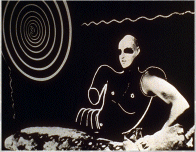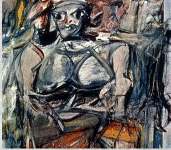
 Cultural Solipsism
Cultural Solipsism

 Cultural Solipsism
Cultural Solipsism
by Robert S. Robbins
Although our national culture may be a vast wasteland, an individualís cultural life need not be as bleak. It is possible to improve your cultural life by a careful selection of books, music, film, artwork, and theater. Many of the complaints about the nationís culture are based upon what is readily available. For instance, critics will complain that an art house film isnít shown on television or doesnít make it onto the screens of the local Cineplex even though it is available on home video. Their complaint is with the filmís availability, not that there are no such films. But I would argue that it is the responsibility of the aesthete to seek out great art. You must decide what works of art to bring into your life instead of just accepting whatever is put before you on television or on the supermarket bookshelves. Mass media has created the impression that a creative work is insignificant if it is not a common experience enjoyed by millions. We need to break free of this limiting mentality and accept a form of cultural solipsism.
 Cultural solipsism is
a new way to look at cultural life, emphasizing the private nature of an
aesthetic experience. Through personal taste, the aesthete can fashion an
enriching cultural life for himself regardless of the paucity of his
nationís culture. If you think about it, youíll realize that no aspect of
the national culture enjoys a universal audience. There are always a few
people who are ignorant of the great artworks on display in the nationís
museums. There are many people in this country who have never read the
novels of William Faulkner. Since they have neglected to enrich their lives
with these paintings and novels, we canít really say it is a part of their
cultural life. Your cultural life is comprised of exactly which books you
choose to read, which plays you go to see, and which paintings you buy as a
print or reproduction. Everything that you exclude is lost to you. This is
the essence of cultural solipsism.
Cultural solipsism is
a new way to look at cultural life, emphasizing the private nature of an
aesthetic experience. Through personal taste, the aesthete can fashion an
enriching cultural life for himself regardless of the paucity of his
nationís culture. If you think about it, youíll realize that no aspect of
the national culture enjoys a universal audience. There are always a few
people who are ignorant of the great artworks on display in the nationís
museums. There are many people in this country who have never read the
novels of William Faulkner. Since they have neglected to enrich their lives
with these paintings and novels, we canít really say it is a part of their
cultural life. Your cultural life is comprised of exactly which books you
choose to read, which plays you go to see, and which paintings you buy as a
print or reproduction. Everything that you exclude is lost to you. This is
the essence of cultural solipsism.
Theater provides an excellent example for this concept. Although a community theater may claim to present great performances for its community, the fact is that only a small audience can be accommodated. Only the people who choose to go to the theater have actually experienced the performance. It cannot be argued that anyone else was enriched by the cultural event. Only a select few, the audience members, will ever have that profound experience to add to their cultural life. This concept can be extended to books, paintings, and music. A classic novel also has a finite audience comprised of the rare individuals who open the book. Only the people who read through a Russian novel can number it among their fond remembrances. We can refine the concept still further by acknowledging the importance of genuine appreciation. Even among the theater audience, it is only the individual who is truly moved, inspired, or enlightened who gets anything out of it. Indifference or lack of appreciation also limits a personís cultural life. Those who are poor in spirit will not be enriched by an abundance of cultural treasures.
 If culture is a private
experience, then it should be possible to fashion an exceptional cultural
life. The aesthete can surround himself with a personal library of great
books and a personal collection of great art (reproductions, an original is
unnecessary for the purpose of private appreciation). We can live as if we
lived in a renaissance age! In regards to public art, the aesthete can
become a regular play goer and visit architectural wonders in the region.
Television and home video make private screenings of films an accepted
practice. In creating a private cultural life, your personal tastes should
determine its quality and scope. Mass media and academic acceptance should
not be allowed to influence or dictate what you read or see. The fact of the
matter is mass media, mass distribution, and mass marketing over determine
our cultural life and limit the possibilities to a shocking degree. You need
to liberate your imagination to accept more personal choice and accept
yourself as a valid arbiter of quality.
If culture is a private
experience, then it should be possible to fashion an exceptional cultural
life. The aesthete can surround himself with a personal library of great
books and a personal collection of great art (reproductions, an original is
unnecessary for the purpose of private appreciation). We can live as if we
lived in a renaissance age! In regards to public art, the aesthete can
become a regular play goer and visit architectural wonders in the region.
Television and home video make private screenings of films an accepted
practice. In creating a private cultural life, your personal tastes should
determine its quality and scope. Mass media and academic acceptance should
not be allowed to influence or dictate what you read or see. The fact of the
matter is mass media, mass distribution, and mass marketing over determine
our cultural life and limit the possibilities to a shocking degree. You need
to liberate your imagination to accept more personal choice and accept
yourself as a valid arbiter of quality.
The Internet offers an excellent opportunity to develop cultural solipsism because you only find what you are looking for online. Nothing is being pushed on you, everything is readily available, and you are entirely responsible for what content gets delivered to you. It is inaccurate to talk about an Internet Culture or otherwise characterize its content. The Internet offers so much content that you can imagine it shares your preoccupations. This illusion is created by the ease with which you can pursue your interests and the fact that you never have to compromise. The Internet can feed your cultural life with exactly what you need or desire.
But my development of this concept arose from a particular difficulty. My cultural life is enriched by inner experiences which must remain private. The concept of a cultural life entirely defined by a shared, public culture of common cultural references cannot account for the effects of inner experiences upon an individualís cultural life. Over time I have come to realize that the sublime is to be found within myself and should not be ascribed to the apparent inspiration. My appreciation of a film, performance, or image often has less to do with the inherent qualities of the creative work than with my intuitive perception of its essence. When my imagination is sufficiently engaged by a work of art, I frequently find myself inspired to create a more grandiose vision in my mindís eye. My appreciation of art can be exaggerated by this profound emotional response and then things assume a far greater significance than they warrant. When I have made the mistake of seeing too much significance in the mass media, my interest has eventually faded and I then realize there was nothing there after all. For this reason, I distrust my obsessions. But the sublime is too powerful to ignore and it is obvious that I am very sensitive to it. I find the sublime in everything. A few poets have commented on this ability to discern the sublime in everyday life. It is considered a remarkable gift. My gift enriches my cultural life in a very private fashion and encourages my self-absorption. Cultural Solipsism provides an ideal concept for understanding this self-absorption.

